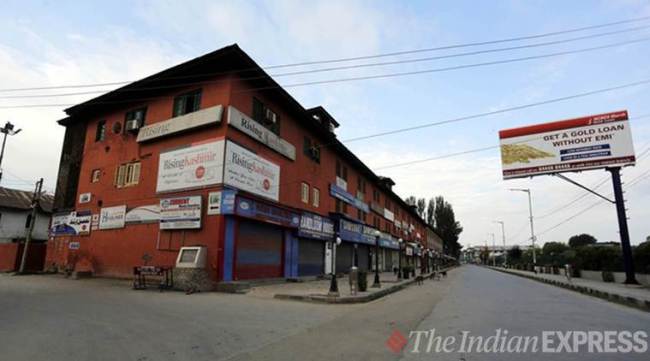Opinion The Urdu Press: Kashmir, Article 370
Siasat’s editorial on August 6 notes that “now that Jammu and Kashmir’s special status has been revoked, the government must brace up to answer queries of common people”.
 Security personnel guard various points on Eid-al-Adha after the scrapping of the special constitutional status for Kashmir by the Indian government, in Srinagar, August 12, 2019. (Express Photo by Suhain Masudi)
Security personnel guard various points on Eid-al-Adha after the scrapping of the special constitutional status for Kashmir by the Indian government, in Srinagar, August 12, 2019. (Express Photo by Suhain Masudi)  AIMIM’s daily, Etemaad, on August 6 views the revocation of Kashmir’s special status as the fulfillment of the BJP’s “electoral agenda”. (Express Photo by Shuaib Masoodi)
AIMIM’s daily, Etemaad, on August 6 views the revocation of Kashmir’s special status as the fulfillment of the BJP’s “electoral agenda”. (Express Photo by Shuaib Masoodi)
Kashmir, Article 370
Munsif, on August 6, has an editorial titled,’Kashmiriyat, Insaniyat our Jamhooriyat ka qatl” (the annihilation of Kashmiriyat, Insaniyat and Jamhooriyat). Another editorial in the paper, on August 7, raises several questions. “Why just Kashmir?.. 10 states benefit from special provisions,” it points out. The editorial notes that in parts of Maharashtra, Gujarat, Nagaland, Assam, Manipur, Sikkim and Mizoram “residents get reservations in jobs and special land purchase options.” It cites the case of Sikkim, “where elections are held once every four years.” The editorial asks: “Why is it that the special measures are questioned only in the case of Kashmir. Is that because Kashmir is a Muslim majority state? ..LK Advani said the cancellation of Kashmir’s special status marked the fulfillment of the Jana Sangh’s old promise. So should we consider this a decision as one for the benefit of the Kashmiri people?”
AIMIM’s daily, Etemaad, on August 6 views the revocation of Kashmir’s special status as the fulfillment of the BJP’s “electoral agenda”. It traces the plan’s origins to the time when the BJP ended its alliance with Mehbooba Mufti’s People’s Democratic Party (PDP). The editorial notes that in spite of Article 370 and 35A, the people of Jammu and Kashmir were “mired in poverty, illiteracy and educational backwardness.” It talks of a complex global situation, and points out that the US president’s statement about PM Modi asking him to mediate in Kashmir had created a complicated situation for the latter. It speaks of “India’s friend, Afghanistan” witnessing a change with the withdrawal of the US on the cards. The editorial points out that that India must manage its home and external situation carefully, after seriously taking stock of developments in the rest of the world.
Siasat’s editorial on August 6 notes that “now that Jammu and Kashmir’s special status has been revoked, the government must brace up to answer queries of common people”. The editorial goes into the question of land being available for people outside the state to buy. Land prices may ease, but locals could be rendered as “employees (mulaazim)” on their own land, the editorial notes. It also argues that “businessmen and people from outside J&K will benefit.” However, people may take “to the courts” to try and stop the new laws from taking effect, the editorial contends.
Inquilab and Roznama Rashtriya Sahara, in a marked shift of tone, welcome the move. Sahara, so far circumspect, expresses happiness, in its editorial on August 14, about the Supreme Court refusing to interfere in the matter. It urges the people of J&K to not get embroiled in khaamakhaa (frivolous) matters and “not give an opportunity to militants to take advantage of the situation.” Inquilab, on August 10, speaks of the PM’s address on the matter as a “marham” (balm). It says that “the Kashmiri leaders raising hell on the revocation of Article 370 must answer, how have these articles helped the people? Articles 370 and 35A “pushed the state into a morass and kept it separate from the rest of India.” The editorial builds a case for “successful central schemes to be pushed into J&K for improvements in education and progress in economic and social life.” Akhbaar-e Mashriq, on August 10, also uses the phrase “soothing balm” for PM Modi’s address. It also says that “it was significant for the PM to say that if terror ends, the present status of J&K will be restored.”
Ayodhya
Roznama Rashtriya Sahara, on August 3, welcomes the decision of the Supreme Court to conduct daily hearings on the Ayodhya title suit matter and is hopeful that the Court will come to a haatami faisla (final judgement). The paper’s editorial says this should have happened much earlier.
Etemaad on August 3, has an editorial on the failed mediation on the Ayodhya issue. It writes, “It is believed that all the participants did not think that a compact was possible in the prevailing political atmosphere.” It makes a significant observation: “The Modi government has managed to convince the majority that irrespective of the Court order, a law in Parliament will facilitate matters…Any party that refuses to go with this will be labeled ‘anti-Hindu’ and the doors of its political future will be shut” It contends that “the way the BJP has been able to push several pieces of legislations in the current session of Parliament raises questions about the sincerity of the secular parties.”
Compiled by Seema Chishti





